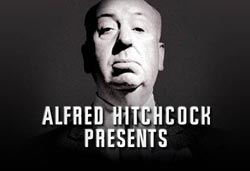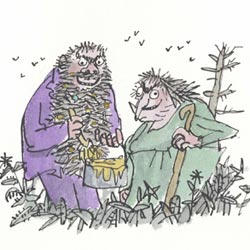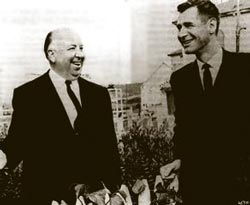
Quite a few big name actors put in time on Alfred Hitchcock Presents – which later expanded its format and changed its name to The Alfred Hitchcock Hour. These luminaries run the gamut, if not from A-Z, then at least from A-W (Ed Asner to Fay Wray) and include Robert Redford, William Shatner, Dick Van Dyke and Peter Falk, just to name a few of the many famous faces to make an appearance.
AHP also relied on the words of quite a few well-known writers over the course of those ten years. The writer the show relied on most was Henry Slesar, who had a hand in nearly 50 Hitchcock episodes. Aside from this busy gig, Slesar was a prolific fiction writer, who turned out quite a bit of short crime and mystery fiction, among other things, and won an Edgar Award in 1960 for one of his few novels, The Grey Flannel Shroud.
Though not as prolific an AHP contributor as Slesar, with only 17 episodes under his belt, Robert Bloch had a rather more famous connection to Hitchcock, perhaps one of the most famous of all. In addition to writing numerous short stories and about 20 novels, some in crime fiction and some in various other genres, he’s probably best-known as the man who gave the world Norman Bates, in his 1959 novel, Psycho.
Most of us probably know Roald Dahl as the man behind a host of kid-friendly (though often with a dark edge) works such as James and the Giant Peach, Charlie and the Chocolate Factory, and The Witches. What’s not generally so well-known is that he penned quite a bit of fiction for adults, much of it considerably darker even than what he wrote for children. Arguably among the best known of these works are a pair of grim short stories, Man From the South and Lamb to the Slaughter, both of which were made into outstanding Hitchcock episodes, with the former starring Steve McQueen and Peter Lorre.
Ray Bradbury is best-known for his fantasy and science fiction, but has also dabbled in the mystery genre, most notably with three novels, the most recent of which appeared in 2002. Bradbury, whose I Sing the Body Electric was the basis for a memorable episode from another TV show from this era – The Twilight Zone – contributed to a total of seven Hitchcock episodes.
Other notables who wrote for AHP, or had work adapted, included science fiction and mystery writer Fredric Brown, whose popular short story Arena was later adapted for a Star Trek episode and who contributed to five episodes of Hitchcock. A short story by popular crime writer Cornell Woolrich was adapted for the Hitchcock flick Rear Window, and he also had a hand in three Hitchcock TV episodes.

Image via Ed McBain’s website.
William I. Lengeman III is a freelance journalist with a fondness for gourmet tea and traditional mysteries. He writes about the former at Tea Guy Speaks and the latter at Traditional Mysteries.
